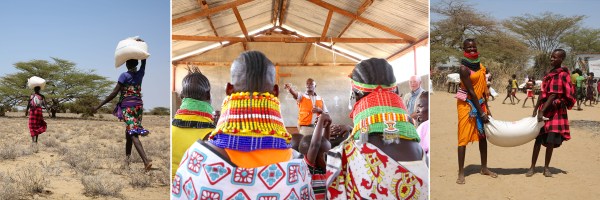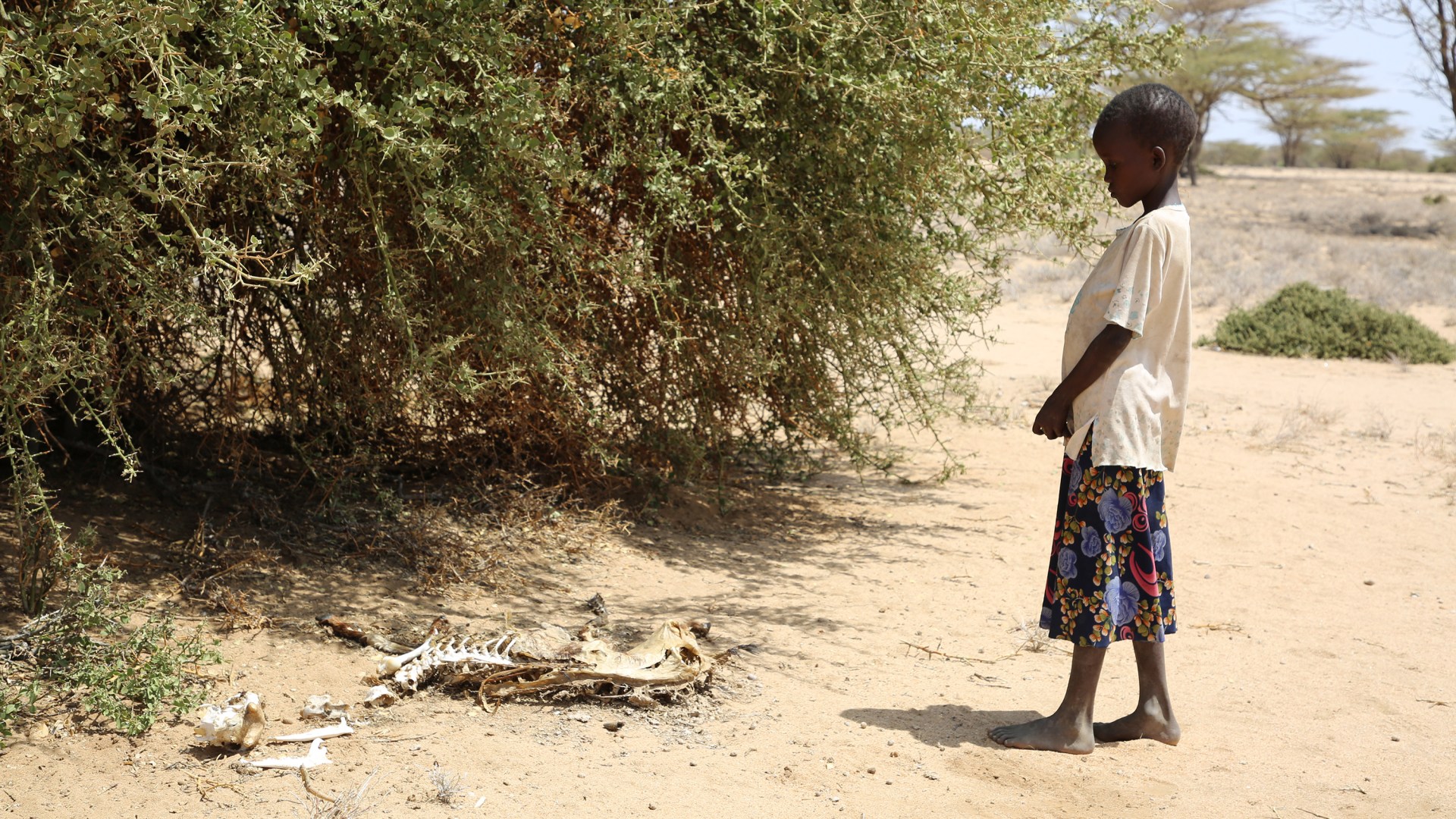“I am the father and mother of my children,” said Regina, sitting on the ground of the straw hut she built herself and weaving a basket.
The family’s possessions hang on the wall: a plastic blue bowl, a pair of small sandals, a green bottle cap. A toddler plays behind Regina’s back. A baby squirms in her lap. It is midafternoon in Nakorio village in northeastern Kenya, and nobody has eaten today.
Last year, Regina’s husband left for Lake Turkana. Other men have also abandoned their families—some desperate to save their herds of camels and other livestock; some ashamed of coming home to their starving children.
“I don’t even miss him because he doesn’t bring any food for me,” she said. “If he returned, I would chase him away.”
The Turkana, a semi-nomadic people in Kenya, share a plight with millions of East Africans, starving and displaced as a result of the worst drought in at least four decades. The ongoing threat of famine and food shortage in sub-Saharan Africa has become, to outsiders, a global suffering cliché.
But for Christians, the crisis in the dusty East African terrain should offer a jolt of recognition. Famine appears as a recurring character across the lives of Abraham, Isaac, and Jacob—a force that not only incites physical hardship but also brings degradation on their families, a pattern echoed in families like Regina’s.
“The stories of Genesis were not told to teach about famine,” said Yohannes Sahile, an Old Testament theologian at School of Theology at Africa International University, in Nairobi. “But we can find lessons about how to respond to famine even though such lessons were not the main objectives.”
In Turkana, drought and famine further upends their fragile lifestyle. Men care for livestock; women raise children, construct homes, gather and prepare food, and burn charcoal to sell. Most families are polygamous, and, as one local man recounted, women bear so many responsibilities that they’re often the ones approaching their husbands about adding another wife to help.
Even when rainfall is consistent, communities engage in deadly fights over grazing territory. These days, dead camel carcasses and bleached goat skulls lay out in the sun in Nakorio. One local family said they had lost 70 of their 80 animals in recent months.
Since drought struck in 2019, many men left, ostensibly in search of grazing lands for their animals. Without them, women have few ways of providing.
Regina sells her baskets to adventurers. She makes a 12-hour trek on foot to the nearest village to purchase wheat flour on credit. Most days, there’s nothing she can offer her children besides boiled water or tea.
 Photos by Martin Muluka
Photos by Martin MulukaWhen everyone’s weak and lethargic, the family sleeps. “And when my children cry, I cry with them,” she says.
“If you look at it superficially, you may think these men have abandoned their families,” said Tom Masinde, who oversees World Vision’s operations in Turkana. “And, of course, their families will lose access to basic household needs, children will stop going to school, mothers won’t get support while they are away for four to six months. But livestock is their main livelihood, so they are bargaining between losing 50 to 100 goats versus staying here.”
Even if their husband’s motives may be altruistic, few women feel empathy toward them.
“I am thanking God because he gave me this useless man. He has made me go through a lot,” said Margaret, a mother of three kids under the age of four. “I am asking God that he will see what I have gone through and that God has provided me and that he will know God is out there.”
In the Old Testament, some of the patriarchs fled famine with their families and some stayed back. Their stories show how famine multiplies the consequences that families face for another’s selfishness.
In Egypt, Abram, allegedly afraid for his life, abdicates his responsibility to his wife Sarai. He lets Pharaoh bring her into his home after lying and saying they are siblings. In the midst of famine, Isaac similarly lies to the Philistines about Rebecca being his wife. In 2 Kings 6, one woman proposes to another that they should eat her children. After they eat the other woman’s child, she hides her own.
“In this story, where are their husbands? We don’t see them. Women are left to struggle. Women are the ones who feel the pain of family because they have to watch their children die,” said Wanjiku Kihuha, a Kenyan theologian and lecturer at St. Paul’s University and Pan African University.
“What is more important for this man? Is it his wife and children or the animals?” Kihuha asked, lamenting how the desperation of hunger steals human dignity. “I’ll leave it to the men in the community, to interrogate, where is your heart? I know they value animals so much, which may not be our case in this discourse. I say we see it, and those questions are asked, and perhaps we need to be in those people’s shoes to understand, why would your family die for you to save the animals?”
 Photos by Martin Muluka
Photos by Martin MulukaAbout five years ago, World Vision entered the Kalapata community, which sits about a three-hour 4×4 ride away from Nakorio. Part of its efforts involved microlending programs and a new model of child sponsorship where kids select their benefactors. Several families operate convenience stores from their huts.
But a significant part of World Vision’s work has focused on building more relational resilience into the community that is consistently at risk of famine. A new 36-member pastors’ network includes local leaders from the Reformed, Pentecostal, Orthodox, and Catholic churches.
They incorporate World Vision curricula into their service. One course seeks to address fatalism with Scripture. Others focus on marriage and parenting—even within the polygamous context.
Leah doesn’t try to break up families. A pastor in the network who has ministered for nearly a decade, she advises proactive steps to solidify marriages from the beginning, like discouraging child marriage. She also offers encouragement as marital tensions rise over food.
“I advise them that life has a lot of challenge, and they need to persevere,” she said.
Several years ago, Jackson and Aleper had 20 goats. Now the couple, who has three toddlers, can only claim two. Though the family’s livestock was devastated by the drought, Jackson has no interest in leaving family to take care of their animals and says he could always give them to departing relatives to look after.
“Before I joined church I thought could have two wives, but when I went to church, I felt I only had strength for one woman,” he said.
 Photos by Martin Muluka
Photos by Martin MulukaThe Book of Joel suggests that those suffering famine as a form of God’s discipline are not helpless to their circumstances, promising to “repay you for the years the locusts have eaten” (2:25) and “you will have plenty to eat, until you are full, and you will praise the name of the Lord your God” (2:26).
Interpreting a Scripture in today’s context as saying that people only need to pray more to end a famine is problematic, says Kihuha, the theologian. And people should avoid blaming every bad thing on disobeying God or God’s anger.
“However, individual cases of famine were not because of the immorality of the inhabitants of the land. The ancient Near East faced famine regularly as we see in Genesis. Even Egypt faced famine even though it was the one place that the patriarchs went to during famine in Canaan,” said Sahile. “I have heard many Africans confessing that the problems in Africa including famine were because of the sins of Africans. The story of Genesis does not support such interpretation. Abraham left his relatives and country and followed God to Canaan. And yet he faced famine, when he arrived at Canaan. This continued during the times of his descendants. Therefore, even godly people could face famine.”
Instead, those struggling with famine today should understand passages like Joel 2 as reminders that they are not helpless to their circumstances and can continue to call on God.
“In the Bible, we see people negotiating and having conversations with God, and God tells them ‘If my people who are called by my name will humble themselves and pray, I will hear from heaven and forgive their sins and will heal their land,’” said Kihuha. “That’s the kind of agency we see from people, especially in the Old Testament, just humbling themselves, praying, dialoguing with God.”
The current famine threatens the lives of millions across Kenya, Ethiopia, Somalia, Sudan, and South Sudan. Nobody can make it rain, and historically, droughts haven’t persisted for multiple seasons like the current “40-year drought” that many link to climate change. Plus, the Russian invasion of Ukraine, a global source of grain, contributed to inflation, rising gas prices, and a disruption in trade around the world.
Genesis 26 gives an account of Isaac whose family endures famine but does not leave for Egypt for food. Instead, he raises animals but he also plants crops and grows very wealthy. This story suggests that there is something that East Africans can do, says Neema Ndooki Mollel, a Tanzanian pastoral care and counseling PhD student at St. Paul’s University in Kenya.
“The pastoralists are proud that they only depend on the animals, but now, life has changed,” said Mollel, who herself is Maasai, a community where many still practice pastoralism. “They could have got some teaching to help them to know that when you keep the animals that you can manage them, it can be better that you will take care of the family.”
Joseph implores to Pharaoh the need to plan in advance of famine, a lesson Nathan Chiroma, a Kenyan theologian at Pan African University, believes Christians living in fragile contexts should take to heart.
“We don’t have to wait until there is famine,” he said. “When the church is training pastors, we must train people to work with their hands, so that people will not depend on only the government.”
Climate and environmental degradation play a factor in today’s famines, underscoring the role of stewardship and creativity to address the crisis.
“In modern times, we have to be innovative in thinking of how to combat famines. We have to use our spiritual resources, our intellectual resources, to see how we can combat famine,” said Kihuha. “We want to partner with God and with other people.”
Translation provided by Dhymphine Emuron













